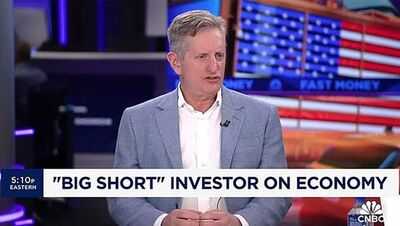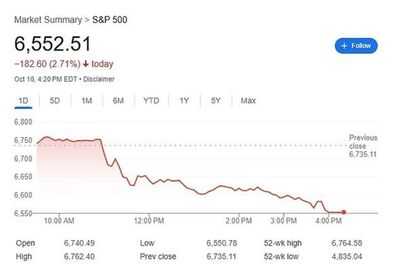
President Donald Trump on Friday reacted to news that China had restricted rare earths exports to the United States by announcing a "massive" 100% tariff rate increase on Chinese imports starting November or sooner. The additional rate increase would add to the 30% already levied on Chinese goods, causing concern among financial experts that the global economy could be at risk of slumping.
Now, the man who famously predicted the 2008 financial crisis and thus profited from the collapse of the U.S. housing bubble has weighed in. In an interview with Daily Mail, Steve Eisman said that Trump's sudden tariff increases might lead to a repeat of the trade war between the U.S. and China in April, once again stoking fears of a global recession.
"I don't see a recession unless there is a trade war with China," Eisman said. "If there is a trade war with China, all bets are off."
- Family portrait exposes sick secret before dad killed all 7 in massacre
- Russia war desperation as sneaky tactic causing 'huge problem'
The rare earths restricted by China are essential for American manufacturing of semiconductors, artificial intelligence infrastructure and tech products. Foreign companies looking to ship metallic elements abroad will now be required to obtain special approval from the Chinese government.
The S&P 500 closed on Friday down 2.7%, the worst market day since Trump unveiled his "Liberation Day" tariffs in April. His announcement came after markets had closed.

Eisman told Daily Mail that China is the "wild card" in trade negotiations. The country controls about 70% of the world's rare earth supply, and 90% of its means of processing it, giving it significant leverage over the state of the supply chain.
"What today showed is that while what we have over China is that they export a hell of a lot more to us than we export to them, what they control are earth metals," he said. "That's their card And it finally reared its ugly head today.
"The U.S. is in a great position to negotiate with any country about trade, because of all the developed countries, it has the least exposure to exports," he added.
"The percentage of U.S. GDP that comes from exports is 11%, which is the lowest number in the world, while most other countries are around 30%."
On social media, Trump described China's export controls that were announced on Thursday as "shocking" and "out of the blue." He said China is "becoming very hostile" and that it's holding the world "captive" by restricting access to the metals and magnets used in electronics, computer chips, lasers, jet engines and other technologies.
Trump pushes Supreme Court to take up tariff case after appeals court loss
Donald Trump announced 100% tariff on 'moral disgrace' China as Dow Jones flatlines
Trump weighs handing out $2,000 tariff rebate checks to Americans
While Trump's wording in his retort to China was definitive, he is also famously known for backing down from threats. Earlier this year, some investors began engaging in what the Financial Times called the "TACO" trade, which stands for "Trump Always Chickens Out," The Associated Press reported.
The prospect of tariffs this large could compound the president's own political worries, potentially pushing up inflation at a moment when the job market appears fragile and the drags from a government shutdown are starting to compound with layoffs of federal workers.
The U.S. and China have been jostling for advantage in trade talks, after the import taxes announced earlier this year triggered the trade war. Both countries agreed to ratchet down tariffs after negotiations in Switzerland and the United Kingdom, yet tensions remain as China has continued to restrict America's access to the difficult-to-mine rare earths needed for a wide array of U.S. technologies.
There is already a backlog of export license applications from Beijing's previous round of export controls on rare earth elements, and the latest announcements "add further complexity to the global supply chain of rare earth elements," the European Union Chamber of Commerce in China said in a statement.
There are other flashpoints in the trade relationship, including U.S. restrictions on China's ability to import advanced computer chips, sales of American-grown soybeans and a series of tit-for-tat port fees being levied by both countries starting on Tuesday.
You may also like

Diane Keaton passes away at 79: Oscar-winner known for 'Annie Hall' & 'Godfather'

Strictly viewers catch Anton's 'too much' comment as he thinks mic is off

PM Modi Meets Anthropic CEO Dario Amodei

CoinSwitch Vs WazirX: Bombay HC Dismisses Zanmai Labs' Appeal

Child marriage and drugs robbing East, NE of vigour: Justice Kant






